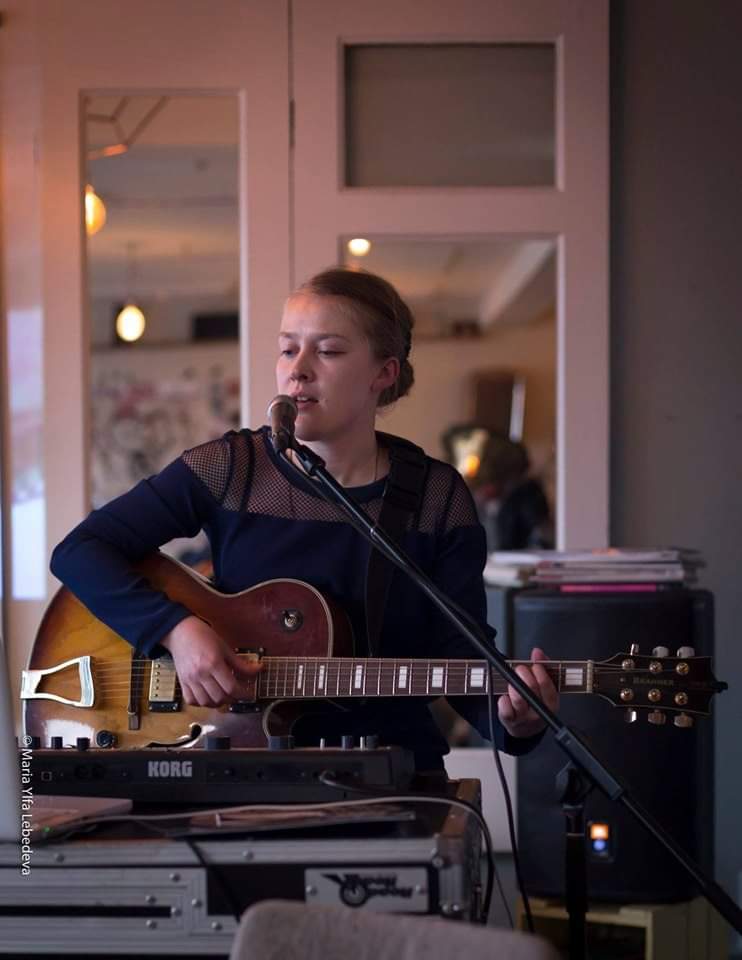Fate can deal some strange hands. A casual conversation at the bar during the interval of a show at the Manchester International Festival introduced me to the Russian polymath who is Irina Shtreis; a linguistics and literature student in Iceland, a qualified journalist, a tour guide in her native St Petersburg, a music critic writing for Russia’s biggest online music site, and an artist recording and performing under the misleading moniker of Miss Naivety.
The tag comes, she says, “partly from self-mockery and partly nostalgia about the past.” Whatever its origin, this speaker of perfect English sells herself short – naïve is the last thing she is now even if she may have seen it differently when she first adopted the name eight years ago.
A confirmed DIY artist today she recorded an earlier EP, ‘World Ocean,’ in an Icelandic studio and is a regular performer in the musical melting pot that is Reykjavik. Latterly she recorded two EPs at home, in Iceland and the UK, under the generic title ‘How to Square the Circle’. Irina explains that the production of two EPs rather than one album was a pragmatic decision – they can be listened to in one go and she found she could revise the content in the short walk between her accommodation and her exchange year university in North London.
She is melody-led, and song ideas often arise as a result of her contemplatively sitting with an instrument (guitar or keyboards) in her lap. “Usually I have a musical fragment which is later developed into a tune”, she says. “I keep singing over it using some words that to me sound consonant with the melody. Later those random collocations are revised in order to produce the actual lyrics.”
“‘How to Square the Circle’ is the concept for an album comprising two parts”, she explains. “Both EPs explore the theme of connection occurring between people despite space, time, cultural misunderstandings and different backgrounds. With the title referring both to alchemy and the mathematical conundrum, it implies the attempt to go beyond the boundaries of assumptions and expectations that cause the same mistakes being constantly repeated. Generally speaking, it is an attempt to learn how to avoid these mistakes and understand the essence of love which means acceptance and readiness for a change.”
The first EP is intimate, fragile and sparse as she rarely uses more than one instrument, usually guitar or keyboard, in each song and randomly adds exterior recordings and various ambient noises, sparingly.
The second EP, though, takes a wider, global view, identifying bonds that occur between individuals while also highlighting processes that inevitably tag humans as irreconcilably different and situated on either side of a barrier, whatever that barrier may be (language, political, or the mysterious ‘circle’ barrier she alludes to).
Perhaps her philosophy can be better explained by listening to one of the tracks from the second EP, ‘Love is Alchemy’. Elsewhere on the EP are tracks which are wholly spoken, one in which Richard Burton reads out a poem, John Donne’s ‘A Valediction Forbidding Mourning’, which was written in the 17th century and which accentuates the stoicism of lovers before they part and their acceptance of separation.
‘Love is Alchemy’ which begins sounding very much like the first side of ‘Tubular Bells’ transforms into a simple, repeated piano melody played to a background of a BBC radio news broadcast about the Salisbury poisonings (the second, accidental one) on a loop and the playing of ‘God Save the Queen’. Irina says “these fragments were chosen specifically for this piece and mention the Salisbury incident, which in this music context is associated with misunderstanding that occurs between people coming from different backgrounds. Just as cultural bonds and historical ties between two countries can be disrupted by political hoax, the connection between two individuals might be affected by over-thinking and frustration on both sides. Yet, despite the barriers which might imply anything from language and mentality to social status and age there is a possibility to change, grow and eventually understand another as yourself.”
Whatever your views on that there is no doubt that it is thought-provoking and that Irina is content to take risks to expound her philosophy, which can contrast with her musical influences, which right now include obscure 1960s psychedelia.
Otherwise she draws inspiration from an eclectic mix of Manchester bands (Joy Division, which she has researched extensively and New Order); also LCD Soundsystem and Stereolab while another Manc band, the Chinese supermarket synth-pop trio W H Lung, has also caught her attention.
Whilst still a student, Irina is focused on expanding her live performances by way of festivals or gigs in London and Manchester, also in Denmark, Iceland and Estonia, as well as writing and releasing another record and finding a label.
I won’t kid you along. If your idea of good music is ‘Agadoo’ or ‘Shaddup you face’ (as unlikely as that is), you’ll find Miss Naivety too much of a challenge. If you like an intellectual challenge set to music though, ‘How to Square the Circle’ will be right up your street.




